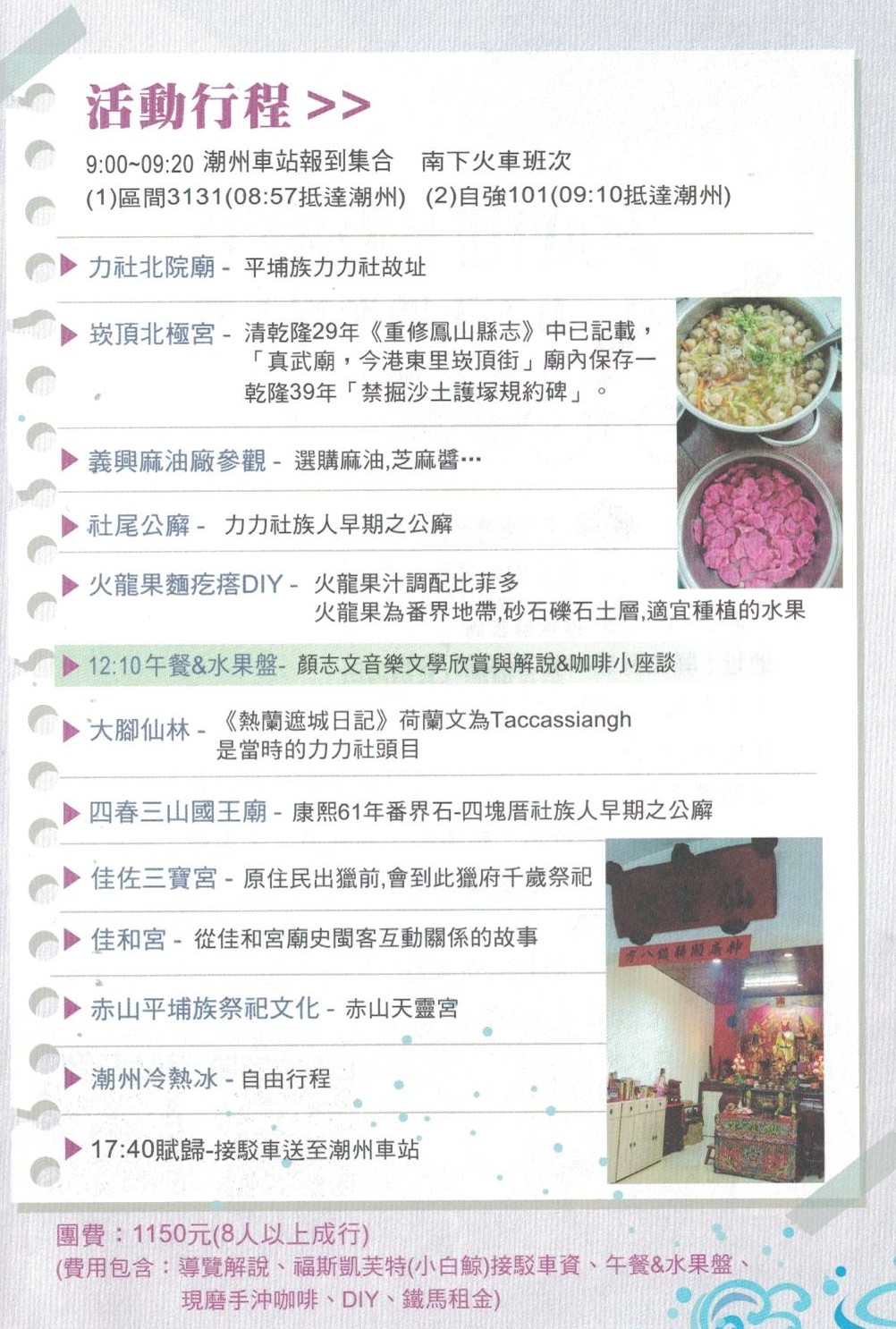Latest News
Introduction to XinPi Township
XinPi Township (Hakka: xinˊ biˊ hiongˊ) is located in the central part of Pingtung County, Taiwan. It is situated approximately 28.4 kilometers southeast of the Pingtung County government. It belongs to the Left Division of the Liudui region, with about fifty percent of the population being Hakka people. There is also distribution of the Makatao indigenous people of the Pingpu tribe.
History of XinPi Township
Originally part of the Jiaoting District in Fengshan County, Tainan Prefecture, Fujian Province, this township became part of Taiwan when it was ceded to Japan in 1895. The following year, it was placed under the jurisdiction of the Donggang Branch Office of the Akōchō, and it remained so until the 9th year of the Taisho era (1920). After the revision of the Taiwan street and township system, it was planned as Xinbi Township in Chaozhou County, Kaohsiung Prefecture, with the establishment of the Xinbi Township Office as its administrative center. Following the Republic of China's takeover of Taiwan in 1945, the street and township system was abolished, and the area was renamed Xinbi Township, with the Xinbi Township Office serving as the local administrative center under Kaohsiung County. In October 1950, due to administrative region adjustments, it has since been under the jurisdiction of Pingtung County.
The population of Xinbi Township
According to statistics from the Chaozhou Household Registration Office of Pingtung County, as of the end of 2022, Xinbi Township had approximately 3.5 thousand households and a population of around 9.6 thousand people. The villages with the highest and lowest populations in the township were Xinbi Village and Nanfeng Village, respectively. As of the end of 2022, the populations of these two villages were 2,185 and 803 people, respectively.
The San-Shan Kings Temple in Xinbi
The San-Shan Kings Temple in Xinbi is located at 49 Xin Hua Road, Xinbi Village. It was established in the sixth year of the Qing Dynasty's Tongzhi era (1867) and conducts pilgrimages to the San-Shan Kings Temple in Jiuru Township.
New Comers


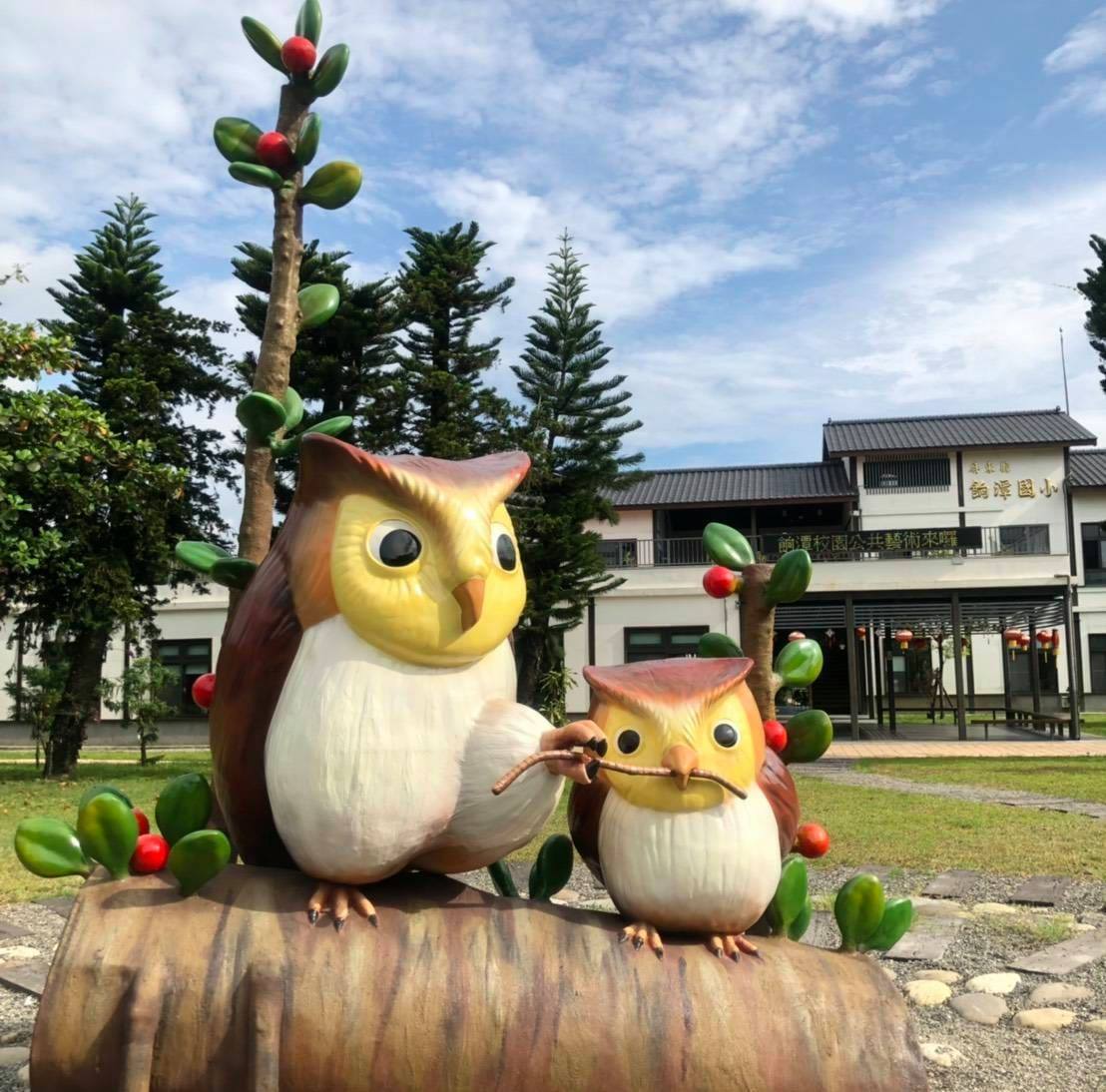
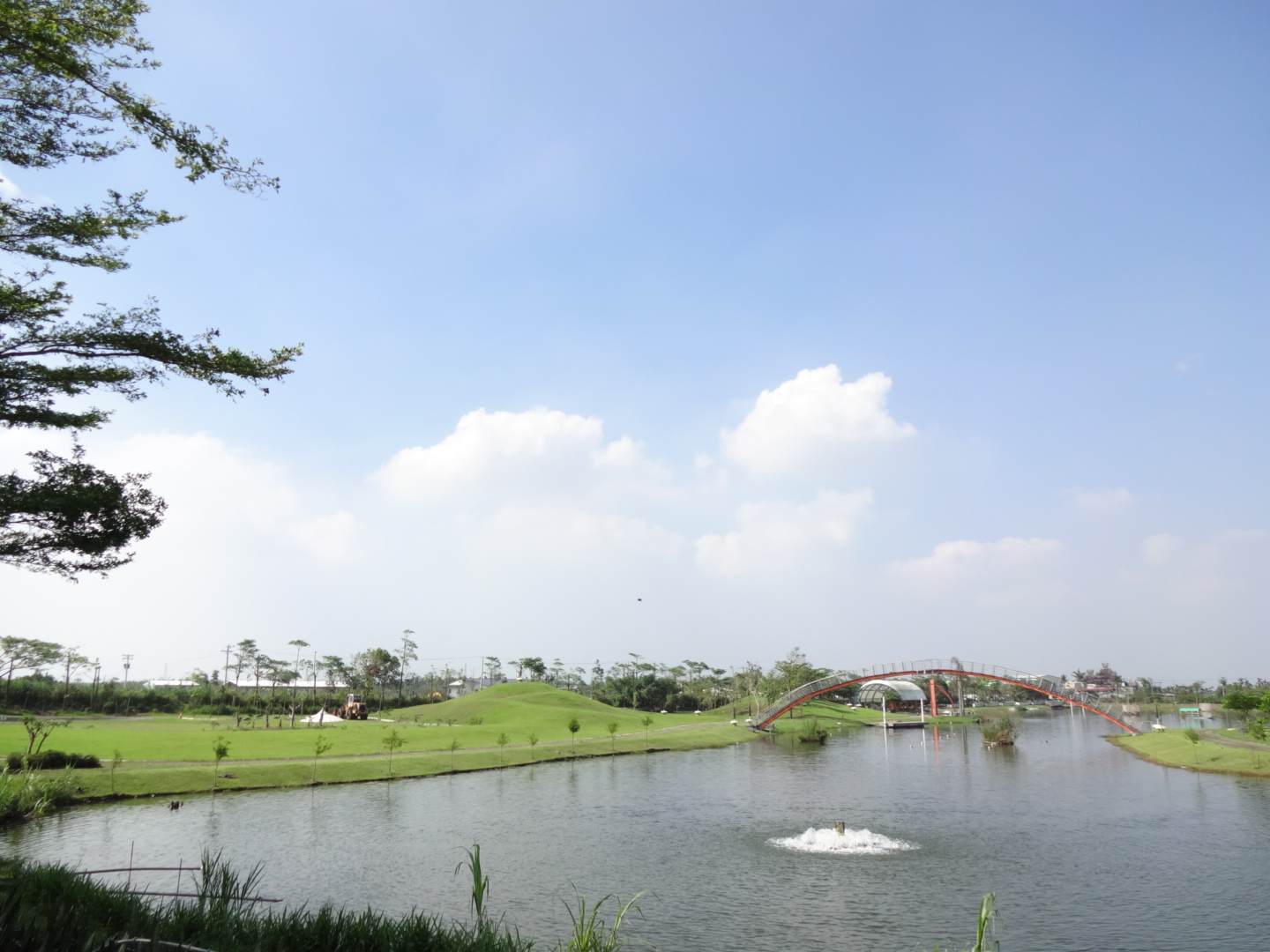
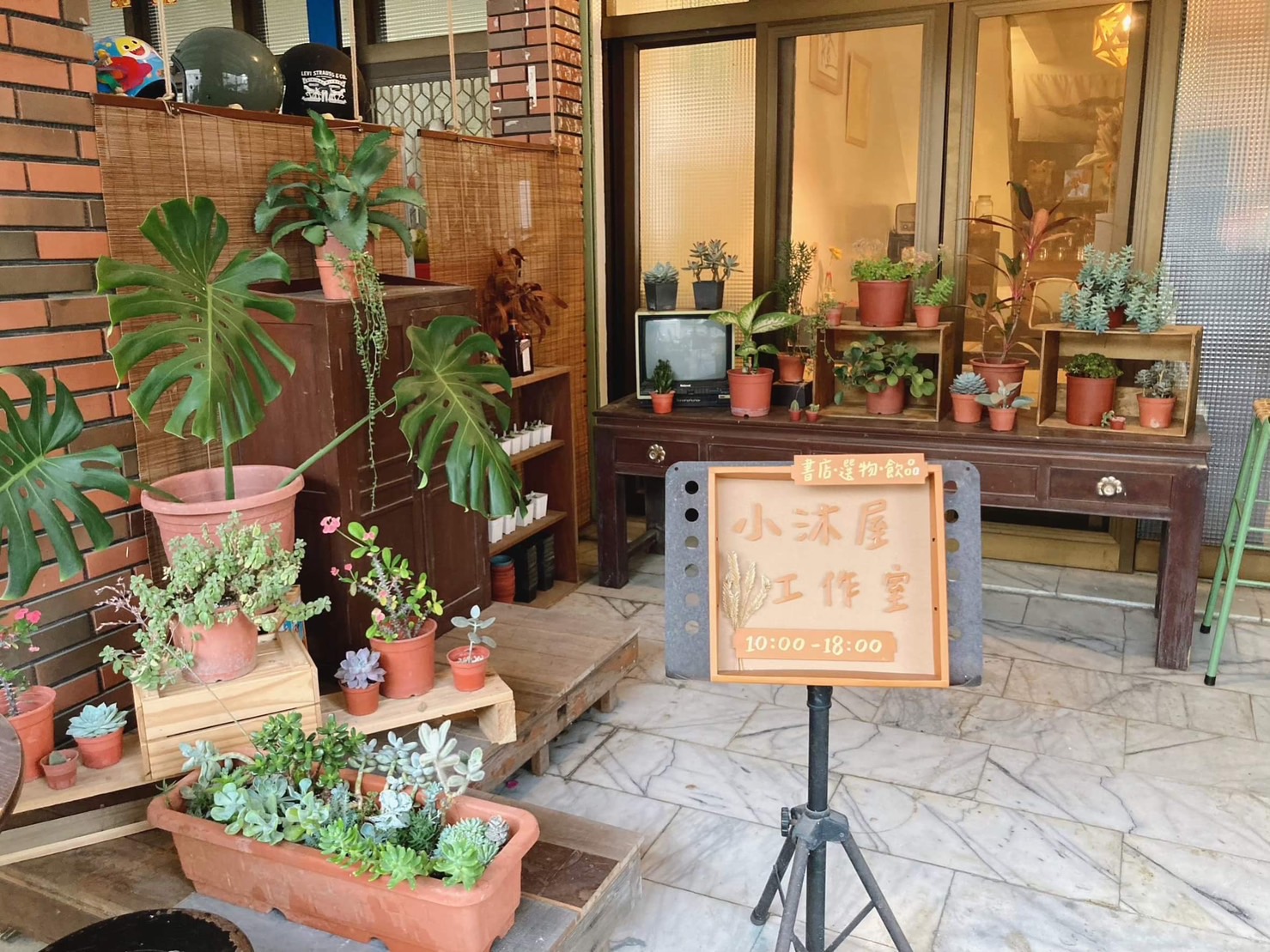
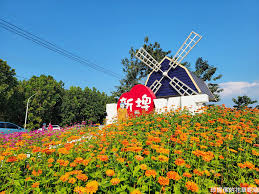
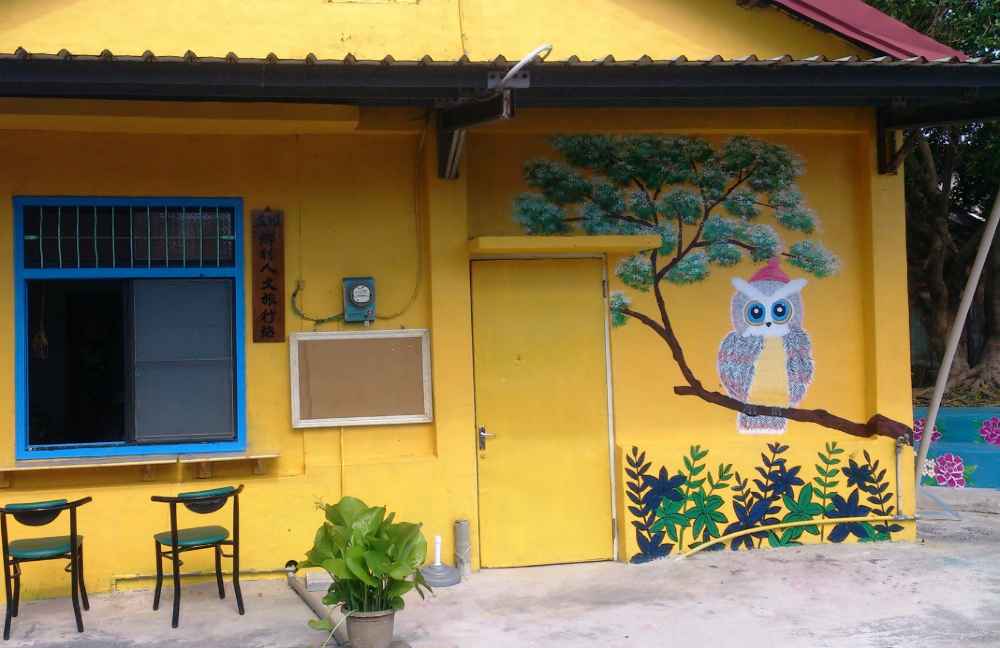

Eating in Xinpi
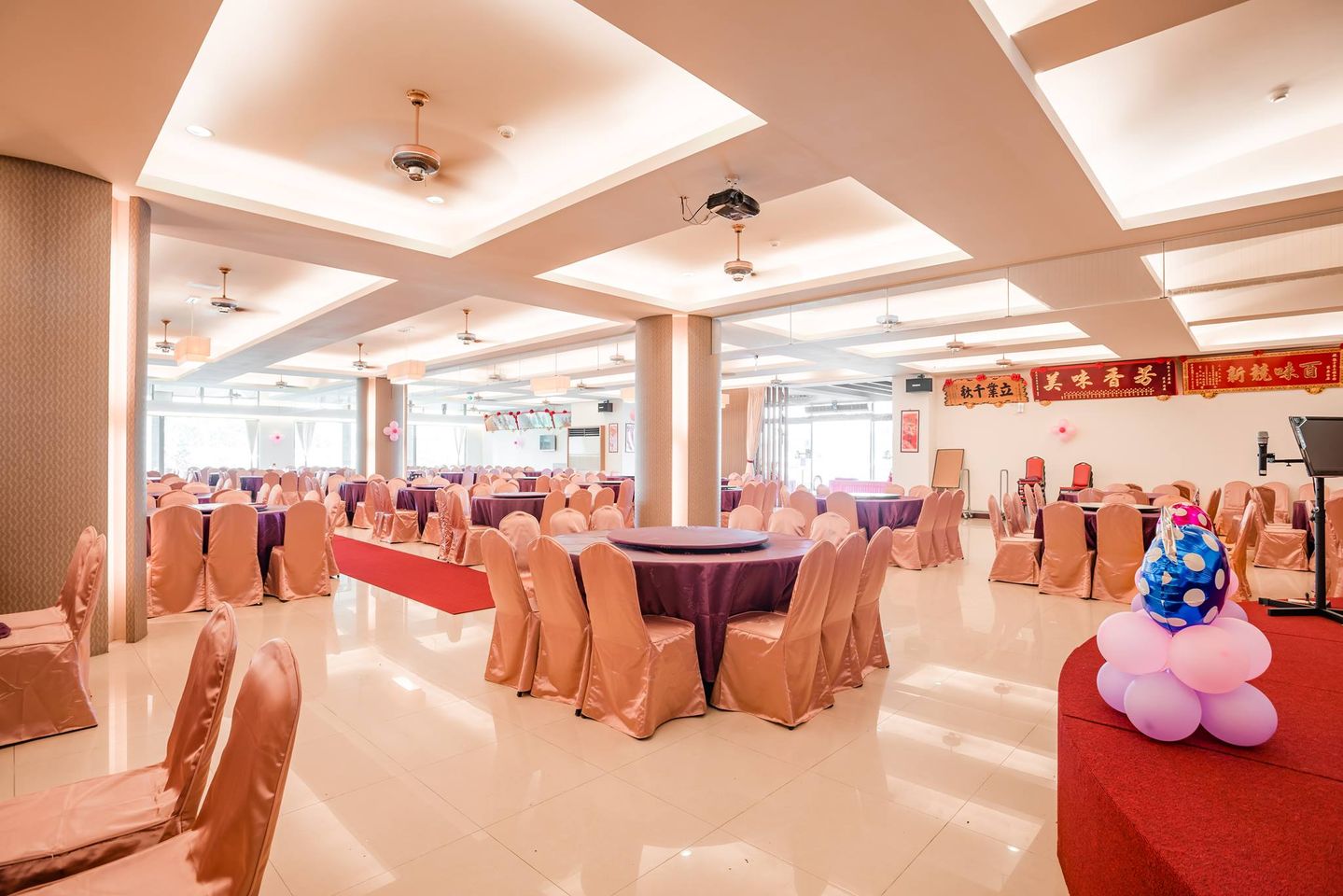
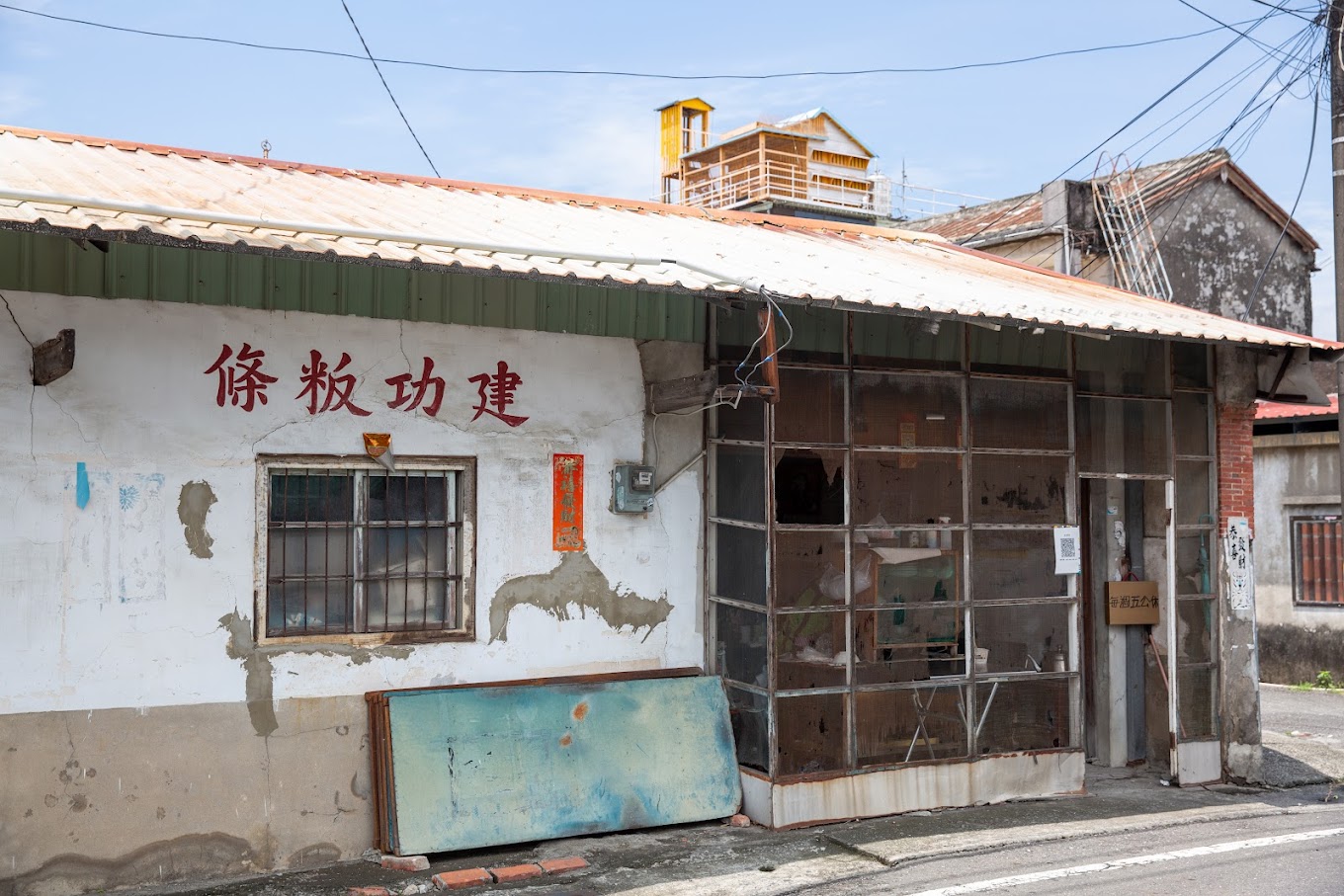
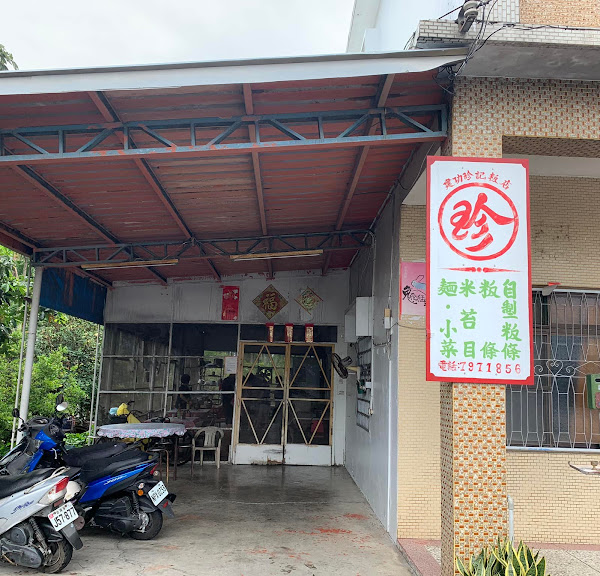
Vitamin C in Xinpi
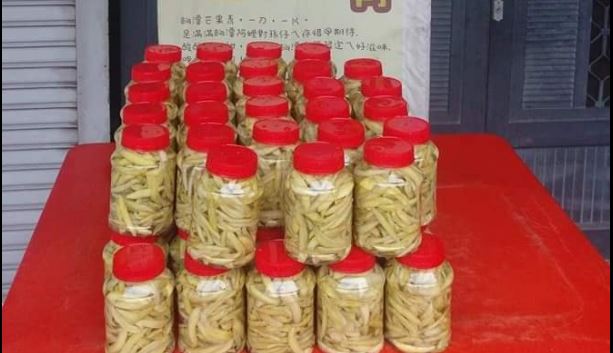
Grandma's Green Mango from Xiangtan Elementary School
In the scorching summer, just take a bite of the refreshing green mangoes.
NT $120

Nanzhou Farmers' Association - Magical Encounter with Fairy Fruits
As if placed in a wax apple orchard .
NT $160

Chengxiu X Weiting Bakery
The perfect fusion of French pastries and fresh fruits from Xinpi Pineapple, passion fruit, and lemon pitaya offer three new flavors Suitable for both gifting and personal enjoyment ❤️
NT $360

TungLungTang Turtle Jelly
Turtle jelly was a precious dessert exclusively served to emperors in the Qing Dynasty. Now you can taste it for just fifty Taiwanese dollars!
NT $45

Xinpi Lemon Fragrant Silk
The layered texture of lemon and plum merging together creates a multi-dimensional sensation. As you savor each bite, the refreshing aroma of lemon peel spreads, akin to the taste of longing, leaving an endless reverie.

Da Feng Herb Garden - Tea Tree Essential Oil
Pure Handcrafted Steam Distilled Essential Oil
NT $300
Theme Travel
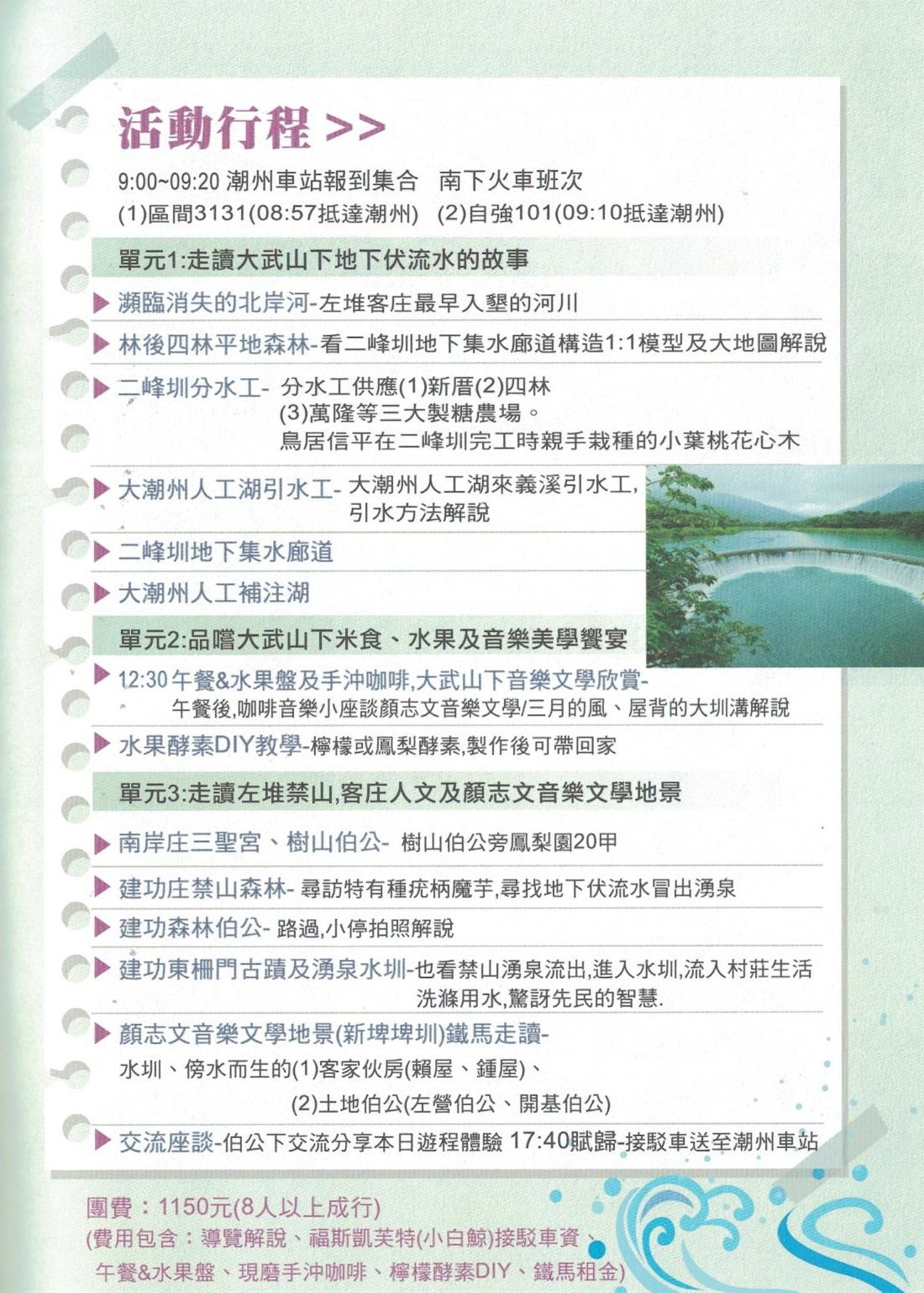
Title1: The Story of Subterranean Springs Below Dawu Mountain
Naturalist Mr. Chen Guan-xue, in his work "Autumn in the Countryside," refers to Dawu Mountain as the "Mother Mountain," a term that signifies the motherly essence of Pingtung. Why do the people of Pingtung call it so? Each year after the spring equinox and during the grain rain season, Taiwan's airflow shifts from the northeast monsoon to the southwest, bringing moisture-laden clouds from the sea. As these clouds encounter colder temperatures atop the north-south Dawu Mountain range, they condense into precipitation, infiltrating the forests and slopes to nurture underground springs. From October to March of the following year, when the northeast monsoon returns and southern Taiwan enters the dry season, the forests of the Dawu Mountain range continue to slowly feed the plains' irrigation channels, nourishing crops and sustaining the people living beneath Dawu Mountain. During the Japanese colonial period, efforts to develop underground springs at Erh Feng Tseun resulted in the completion of water diversion tests a century ago (1922), harnessing resources from the underground springs beneath Dawu Mountain. However, even earlier, during the Qing Dynasty, ancestors in Zuotuike Zhuang understood the wisdom of "planting trees to create forests to conserve underground water." In the Qing period, the alluvial plain beneath Dawu Mountain, with its unstable riverbeds lacking embankments, often saw floodwaters surging across its alluvial plain, affecting the four nearby Zhuangs of Zuotuike (Nan-an, Chien-kung, Chien-san, and Chang-lung). To combat these floods, villagers pooled resources to purchase land to the east of the village, planting trees to form forests known as "Shu Shan." Rules were established to prohibit unauthorized entry and woodcutting, preserving the forests, also known as "Prohibited Mountains." Besides flood prevention, these forests beneath Dawu Mountain also served to conserve groundwater sources for irrigation and daily use. The records of the "Shu Shan Association" of Nan-an Zhuang (1829, Daoguang Reign) reflect the wisdom of their predecessors: "Having heard that securing the land is the first priority, and shading the fields is essential. Following ancient practices of gathering cottages and arranging wilds, one can reside in peace and ease. By digging wells and cultivating fields, the sources of water do not deplete, all relying on the deep forests. To the east of Nan-an, there is Shu Shan, where the trees thrive and the bamboos flourish. They can resist the absence of wind and fertilize the soil, and from the roots grow the spring waters. It is said that they can protect against shortages and water disasters. Without Shu Shan, there would be no benefit." Therefore, exploring the application of underground springs in the Dawu Mountain range can be divided into two categories: (1) Flowing from the slopes of mountainous forests into valley streams in the mountainous region (such as the underground springs of Erh Feng Tseun). (2) Flowing from the Dawu Mountain range downstream into the underground springs of Pingtung Plain, conserving beneath the forests of the plains. When the pressure of conserving groundwater is high, it will generate the phenomenon of self-flowing springs or gushing springs, and the springs will converge to form gushing spring channels, flowing into fields to feed crops and into villages and settlements. Their relationship with the water channels reflects closely the belief in village guardian gods, the arrangement of kitchens, and the golden lines associated with water. The culture and humanities left behind by the villages' lives, production, and ecology (three lives) and the relationship with the water channels have created cultural landscapes and humanities. Through guided tours, experts lead the way and experience, satisfying the traveler's knowledge-seeking and seeing desire and the experience of cultural differences.
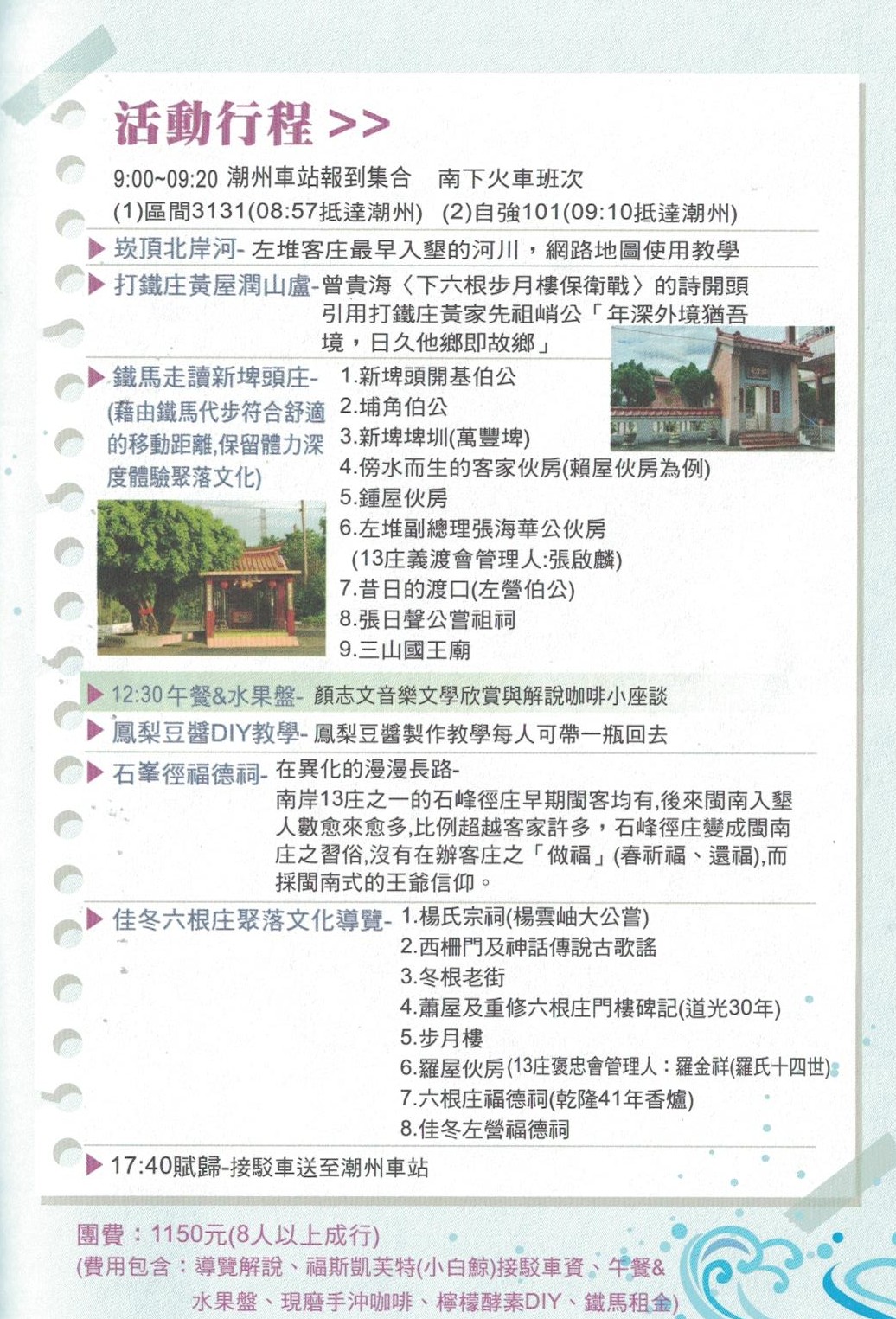
Title2: Exploring the Thirteen Villages of Nan'an in Zuodui
Understanding the Hakka Culture of Zuodui in Liudui requires delving into the migration routes of the early Hakka pioneers, the establishment of Hakka settlements, and the cultural heritage they left behind. This forms the focal point of our experiential journey planning. Historical Background of the Theme Tour Exploring the River Routes of the Southern Dawu Mountain Alluvial Plain from the Verge of Disappearance of the North Bank River and Ancient Maps The Hakka Pioneers of Zuodui Came by Waterways Before the 35th year of Kangxi (1696), the position of Fujian Navy Commander was held by Shi Lang. "In the end of General Shi Lang's life, there was a strict prohibition against the Hui-Chao people of Guangdong from crossing to Taiwan. It was because the place of Hui-Chao was a den of pirates and had been long notorious for such activities." Upon Shi Lang's death, this prohibition gradually relaxed, allowing the people of Hui-Chao to start crossing over. Hakka immigrants arrived in Taiwan mostly after Kangxi's 35th year, often through clandestine channels, arriving alone and establishing settlements in less flood-prone, higher-altitude jungle areas. Their migration routes were broadly divided into three lines: Central, Southern, and Northern. The Southern Line, which is the entry path for our theme, will be explored in our journey. Early settlement in the Southern Line started with the entry through Donggang Creek, crossing established Hakka and Pingpu tribal villages like Kanding, Nanzhou, Donggang, and Linbian. Crossing the North Bank River (a tributary of Donggang Creek), they founded "Nan'an Zhuang" (present-day Nanfeng Village, Xingpi Township). This marked the beginning of Hakka cultivation in the Southern Line. Later, individuals like Lin and Huang from Zhenping developed Datie Zhuang; Zhu Jianguo established Jianguo Zhuang; and individuals from Chengxiang such as Zhang and Zhong founded Xinpitou Zhuang. Concurrently, people from Zhenping like Dai Changlong crossed the Linbian Creek, founding Changlong Zhuang, followed by the establishment of villages like Liugeng, Shifengjing, Banjiazi, Shangputou, and Xiaputou. Subsequently, thirteen natural villages were gradually established in this area, collectively known as the "Thirteen Villages of Nan'an," also forming the scale of Zuodui's collective organization. Furthermore, regarding the path of the Guangdong Hakka people's immigration to this place, aside from the theory that they first established themselves in Nan'an Zhuang, due to the geographical location of Jia Dong being a coastal settlement, after the mid-Kangxi period, the Guangdong Hakka people immigrated here either directly from Jia Dong's coastal rivers and ports or directly from Linzibian Creek, upstream to establish the foundations of Xinpi, Jia Dong, Changlong, and Wudingtan Hakka settlements. This possibility also exists. Before the end of Kangxi (1722), Hakka immigrants to Taiwan were mostly single and engaged in tenant farming work. Between Kangxi 23 and 35, the Hakka people in the southern Liudui region were restricted by the three bans on migration to Taiwan, with very few individuals migrating, and most arriving after Kangxi's 35th year when the prohibition gradually relaxed. During the Kangxi era, Hakka people arriving in Taiwan were mostly single and viewed as "trans-provincial migrants," often returning to Guangdong to sell grains at year-end to support their families and then returning to Taiwan again in spring. Furthermore, during the early Qing rule of Taiwan, the Qing government sent back Zheng's officials and some of the original Zhang and Quanzhou citizens, totaling around 100,000. According to Chiang Yu-ying's "Taiwan Prefecture Record": At that time, Taiwan had only 30,229 people, 8,108 Aboriginal people, and another 546 people in the Pescadores. In addition, there were 10,000 land and naval troops, totaling approximately 50,000 people. Because "the land is empty, and the civil and military officials of the Qiaojuzhu live in the prefecture," the magistrate of Taiwan and the officials of the county actively recruited mainland immigrants to Taiwan. When Liu Yan died, the Qing court also allowed unrestricted cross-strait travel, and many people followed the smugglers to Taiwan. As a result, there was a massive influx of immigrants to Taiwan at the end of the Kangxi period, as recorded by the Taiwan Governor Zhou Yuanwen in the 50th year of Kangxi (1711) when "the Guangdong ladder boat is increasing day by day, and it is compiled into the household, with several hundred thousand counts each year." It was also at this time that a large number of Hakka people immigrated to Taiwan, but most were single and engaged in tenant farming work before the end of Kangxi. The Guangdong people who came to the stone were mostly 'farmers', and they were called 'customers' in the place where they were written
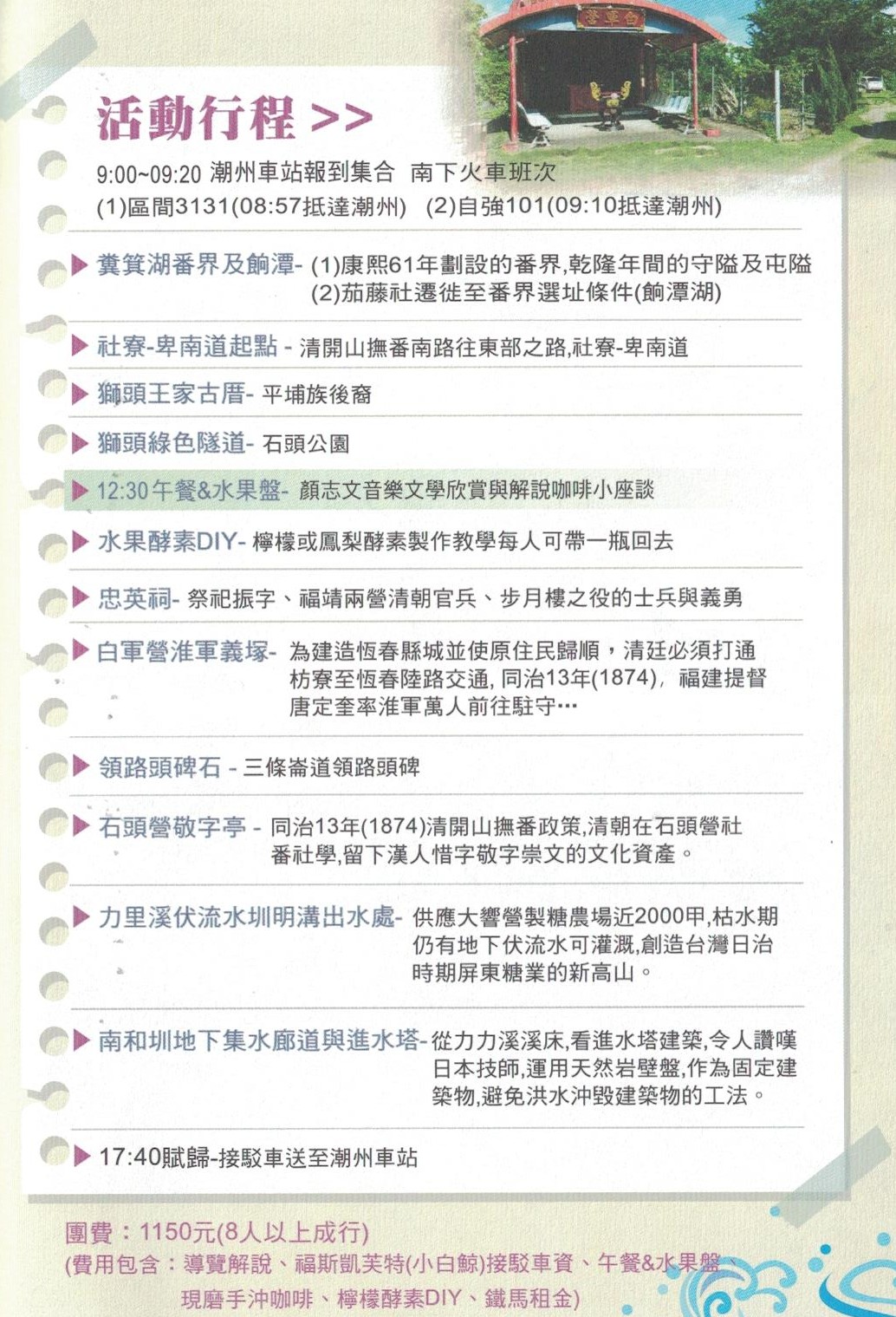
Title3: Exploring the cultural path of the Qing-era development and governance of indigenous tribes, and the underground water journey of the Lili River.
Wandering amidst the mountains and green waters, My mood naturally becomes relaxed. The charm of the Lili River underground flow canal Lies within the forests. Historical Background of the Theme Tour: The Qing government's governance of Taiwan can be broadly categorized into two periods: passive and active governance. The passive phase began with policies and attitudes towards Taiwan, such as the "Taiwan Abandonment Memorial" in the 22nd year of Kangxi's reign (1684) and the "Taiwan Crossing Prohibition" in the 23rd year of Kangxi's reign. After the incident involving Zhu Yigui in 1721, the Qing court established Aboriginal territories and implemented policies prohibiting Han Chinese from entering these areas. During the Qianlong era, a strategy of managing settled Aboriginals versus newly encountered tribes was adopted, deploying Pingpu tribes to guard the borders. According to the "Revised Fengshan County Chronicles," the major points along the Pingpu border in 1760 included locations like Qiwei Creek, Minong Mountain, Zhongtan Village, Longdu Village, Guizaoyao, Aba Spring, Dazheji, Daluguan, Gaolanglang, Binlanglin, Jiazou Village, Fenjihu, and Fangliao, indicating Pingpu tribes guarding the eastern side of this border. By 1775, the policy shifted from mere guarding to settlement, with Taiwan Governor Jiang Yuanshu establishing guard posts at places frequented by Aboriginals, relocating old posts and resettling Aboriginals permanently. This policy aimed to promote settled Aboriginals to farm and guard, gradually encouraging them to relocate from their original lands beyond the borders, thereby opening up new areas for cultivation while maintaining defense. This marked the period of passive governance by the Qing government, which persisted even after the Mudan Incident in 1874, when the Qing court referred to Aboriginals as "foreign tribes" to evade compensation claims from foreign powers. Domestically, there was growing awareness and policy initiatives towards pacifying and integrating Aboriginals. It wasn't until the Sino-French War of 1884-1885, during which French forces invaded Taiwan, that the Qing court recognized the strategic importance of Taiwan's coastal defense. In 1885, Taiwan was made a province, and Liu Mingchuan was appointed as its governor, ushering in the era of active governance focused on defense, military administration, tax reform, and pacification of Aboriginals. The "Taiwan Crossing Prohibition" was abolished to attract more Han Chinese settlers and consolidate Qing rule. Due to financial constraints, the new policy emphasized expanding pacification efforts, exploiting forest resources such as camphor exclusively, and promoting Han Chinese migration for forest development. Efforts were also made to sinicize Aboriginals through education in Chinese language and culture. Tour Itinerary Overview: This tour itinerary begins in the morning with a visit to the sites designated as Aboriginal territories in the 61st year of Kangxi's reign (1722), such as Fenji Lake and Xutan. It explores the geographical conditions and settlement criteria of the Pingpu tribes relocated to the Fenji Lake area during the Qianlong era, along with cultural resources left behind by their descendants. In the afternoon, the tour delves into the cultural path of late Qing-era pacification and integration policies, visiting historical and cultural landmarks left by these policies. Finally, it concludes in the mountainous regions of Ching-shui township, where the beauty of the landscape is savored, and explores the large-scale sugar plantation established during the Japanese colonial period to address irrigation needs during dry seasons, highlighting the mesmerizing allure of the underground flow canal of the Lili River.
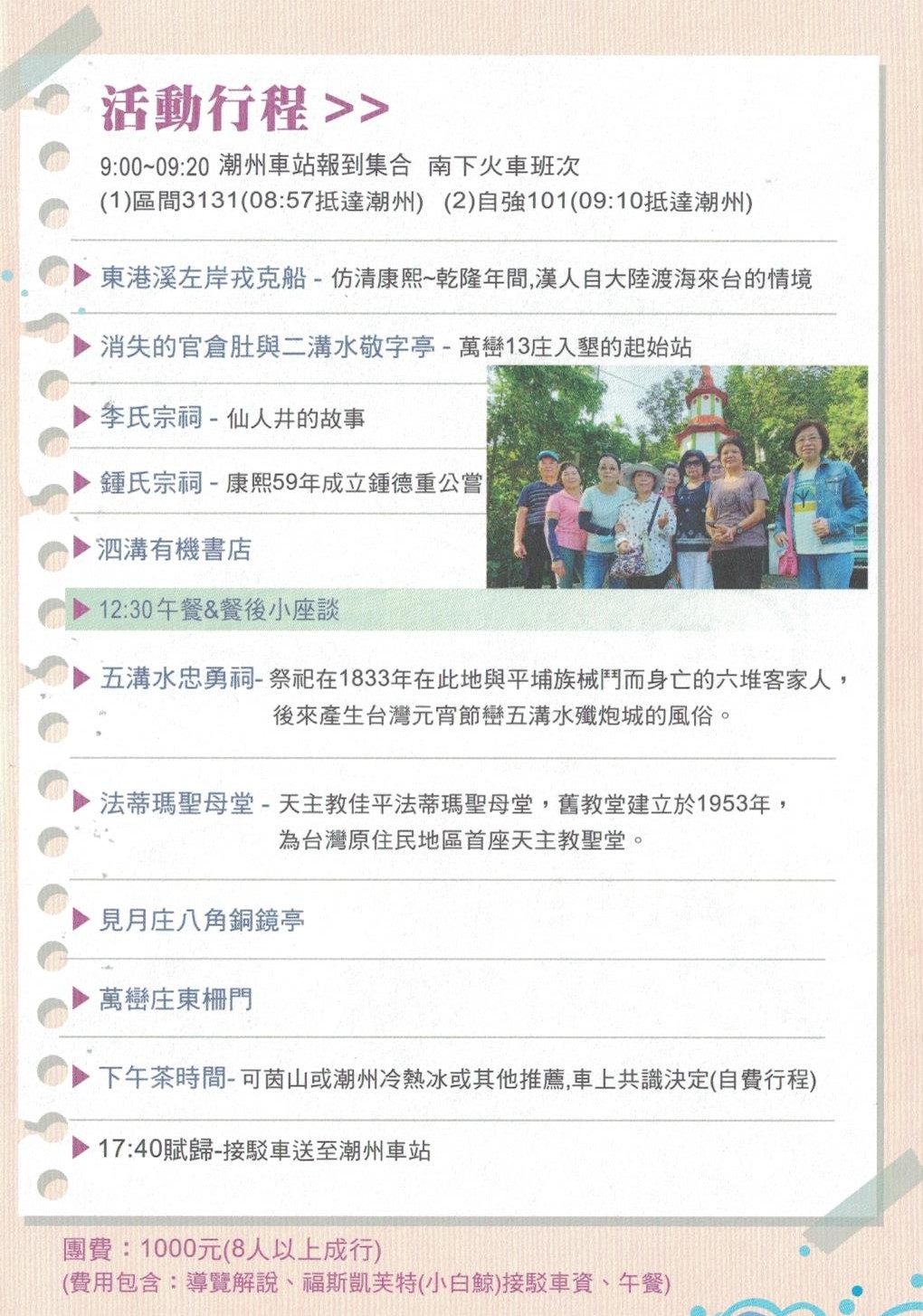
Title4: Exploring the Thirteen Villages of Wanluan
Crossing the Heishui Canal, Entering from the mouth of Donggang Creek, At the Chaozhou Old River Port Pier Walkway, Experience the scene of Han Chinese crossing the sea from mainland China to Taiwan. Historical Background of the Theme Tour The Hakka people's colonization of the Wanluan area, according to Zhong Renshou's "Local Chronicles of Liudui," records that in the autumn of Kangxi 37 (1698), young people surnamed Wen, Zhang, Lin, Zhong, etc., living in Lanlan Village, followed the river to Ergeou Water in Wanluan Township (now collapsed), discovering the area around Guan Cangdu. Although dense with giant trees, it was land suitable for cultivation, so they moved to Wu Chang (also known as Zhuangping), marking the beginning of Wanluan Zhuang. One winter day after lunch break, their plow oxen suddenly went missing, causing great concern. They all set out, following the oxen's tracks. Under the jungle canopy, with tangled vines, they pushed forward step by step. After half a day, they found the cattle playing in a pond, joyfully welcoming their owners. To their surprise, they discovered a spring gushing forth like a fountain. In desperate need of water at the time, everyone was overjoyed and decided to settle here. This spring, now known as "Xianren Well," is located near the Li Clan Ancestral Hall in Wanhe Village, Wanluan Township. They built Wanluan Zhuang around this spring, establishing a prosperous future. They sent people back to Lanlan Village and even to their hometowns to gather farmers to cultivate this land. Determined, they reclaimed hundreds of acres of fertile land. Gradually, they developed Tougu, Ergou, Sangu, Sigu, Wuguishui, and other places, totaling thirteen villages (Wanlian Zhuang, Tougu Water Zhuang, Ergou Water Zhuang, Sangu Water Zhuang, Sigu Water Zhuang, Goubi Zhuang, Wuguishui Zhuang, Gaogang Zhuang, Luliao Zhuang, Liuhuangqi Zhuang, Dalin Zhuang, Desheng Zhuang). Hakka immigrants to the Lower Danshui area (referring to Pingtung Plain), before the end of Kangxi (in 1722), mostly engaged in temporary cultivation, mostly coming alone to Taiwan. This was mainly due to the relaxation of travel restrictions: "Upon the death of General Shi Lang, the prohibition on the people of Huichao in Guangdong was gradually lifted." In the first year of Qing Yongzheng (1723), Lan Dingyuan's "Guangdong Fengwen Taiwan Affairs Theory" stated that "the people of Huichao in Guangdong plant land in Taiwan and are called Kezi. Their residences are called Kezhuang. The number of people is no less than tens of thousands, all without wives and children, and are known for their toughness. Yet their goal is to work the fields and make a living, without any other ambitions." In previous years, travel bans were slightly relaxed, and they would sell grains at the end of the year and return to Guangdong, accumulate wealth, and return to Taiwan in the spring, considering it a normal cycle. However, since the Zhu Yigui incident, toward the end of Kangxi's reign, travel bans became stricter, making it increasingly difficult for people to travel back and forth between the two sides, with costs rising. The Hakka immigrants’ cyclical pattern of farming and reaping became unsustainable. Nevertheless, the perception of Taiwan as easy to cultivate and become prosperous continued to attract Hakka people from Jiaoling and Meixian in Guangdong, as they struggled with a harsh environment of mountains and sparse farmland. Therefore, these Hakka immigrants adopted an organized approach to colonization. This organization mainly involved the establishment of ancestral rites or divine meetings (public meetings), such as the following three explanations: 1. Some Hakka immigrants first organized ancestral rites in their hometowns and sent their relatives to Taiwan to buy land and cultivate (also known as Dagong Taitang Ancestral Worship) 2. With the increase in Hakka people in Taiwan, it has gradually become the name of the ancestral worship of the ancestors of Taiwan. 3. The third type is based on the village of God or cross-tribe god and the mutual help organization, established by different surnames, whether public or god, or mutual help organization, the same characteristics are all people (or family) forces and funds, purchase land to farmers or relatives, and receive “tax grain” (equivalent to rent) as their organizational operation fund. Just like the Hakka people, their ancestral temple is the land of their own public ancestral. Planning Explanation This travel planning simulates the Han Chinese ancestors drifting overseas, crossing the Black Water Ditch, entering from the mouth of Donggang Creek, experiencing the situation of Han people crossing the sea from mainland China to Taiwan at the scenic rest area of the Rongke Ship at the Chaozhou Old River Port Pier Walkway, and re-tracing the Hakka migration route to Taiwan using cultural assets left in the past to witness and experience the historical and cultural significance of Hakka immigration to the thirteen villages of Wanluan. Recognizing the historical conflicts of the past ethnic groups, in the 21st century, ethnic equality is a universal value of UNESCO and World Heritage. Using history as a mirror, we can understand the rise and fall. Recognizing the value of ethnic equality and the beauty of diverse ethnic cultures is a beauty. Different ethnic cultures are indeed strong and weak in real environments. However, "culture cannot have excellent and sub-excellent (or excellent and inferior) division," facing globalization impact, local resistance must also avoid tribalism, and regional diversity of ethnic cultures, cultivate aesthetic literacy.
